Introduction
Are Pigeons Aggressive: Pigeons, those ubiquitous urban birds that grace our cityscapes and public spaces, have long been subjects of curiosity and, at times, controversy. As they coexist with humans in densely populated areas, questions about their behavior, particularly their perceived aggressiveness, have arisen. Are pigeons aggressive creatures, or are they simply misunderstood inhabitants of our urban environments?
In this exploration, we delve into the intricacies of pigeon behavior, seeking to shed light on the common perception of aggression among these birds. Pigeons, scientifically known as Columba livia, have a rich history of interaction with humans, dating back to ancient times when they were revered for their role as messenger pigeons. However, modern urban landscapes have presented both opportunities and challenges for these birds, prompting us to ponder whether their behavior has adapted to the bustling human world.
Through a balanced examination of scientific research, anecdotal evidence, and expert insights, we aim to decipher the truth about pigeon behavior. Are pigeons truly aggressive, or are they simply responding to the conditions of their environment? What factors contribute to their behavior, and how do humans influence their actions? Join us on this journey to gain a deeper understanding of pigeons and the dynamics that govern their interactions with the human world.
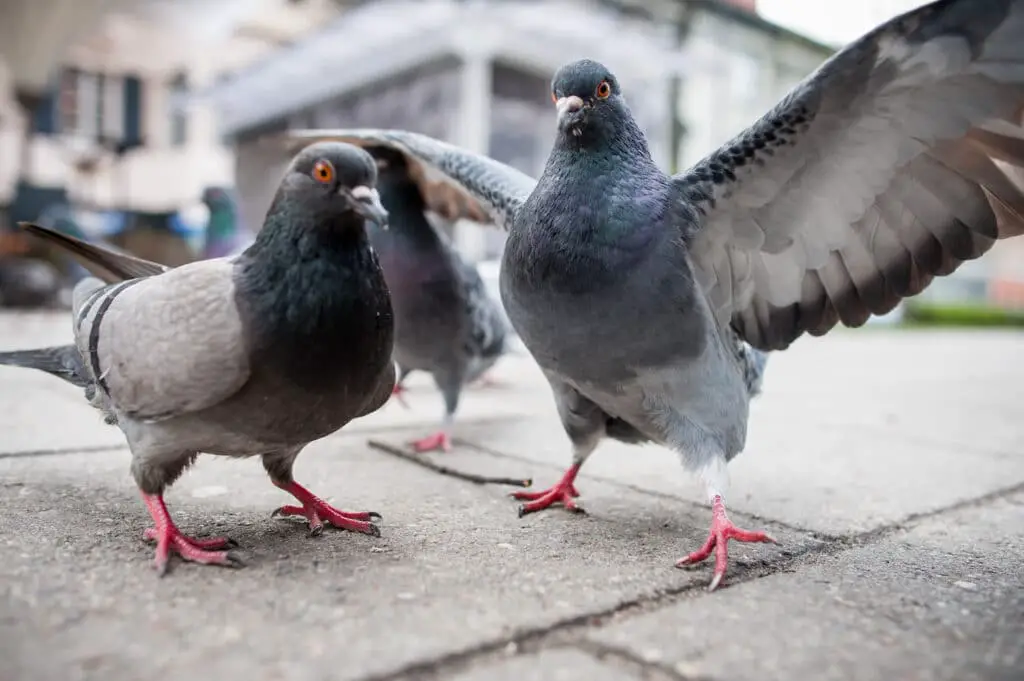
Will a pigeon attack?
They can attack
Pigeons can be cheeky if they really fancy a bite of your sandwich but generally, they’ll stay out of our way. This is unless they feel their young is in danger. If a pigeon thinks you pose a risk to their offspring, they have been known to attack humans.
Pigeons, in general, are not known for attacking humans. They are relatively docile birds and tend to avoid confrontation. However, like many animals, pigeons can exhibit defensive behaviors when they feel threatened or cornered. In such situations, they may flap their wings, coo loudly, or peck in an attempt to defend themselves. These actions are more about self-preservation than aggression.
It’s important to note that pigeons are usually not considered dangerous to humans. In fact, they have a long history of coexisting with humans in urban environments and have become accustomed to our presence. Unless provoked or handled roughly, pigeons are unlikely to initiate an attack. To avoid any potential issues, it’s best to treat pigeons and other wildlife with respect and maintain a safe distance to avoid unintentionally causing them distress.
Are pigeons human friendly?
Unlike feral dogs and cats, feral pigeon are not terribly fearful of humans. They are generally very docile, sweet, and social creatures. Grouping together in large flocks, pigeons go about their lives, eating all the seed, fruit, and discarded food they can find.
Pigeons are often described as “human-friendly” in the sense that they have adapted to living in close proximity to humans in urban areas. They have become accustomed to people and are relatively unafraid of us, which is why they can often be seen foraging for food in parks and city squares. However, this friendliness is not the same as domestication.
While pigeons may approach humans in search of food scraps, they are still wild birds and should be treated as such. Feeding pigeons can disrupt their natural foraging behaviors and lead to overpopulation in certain areas, which can have negative consequences for both the pigeons and the environment. It’s important to interact with pigeons respectfully and responsibly, avoiding behaviors that may harm or disturb them.
Are pigeons ever aggressive?
Pigeons do not attack people, ever. A nesting bird will hit you with their wings when you try to come close to the nest. You will feel the hit, but it will not break your fingers or so.
Pigeons can display aggressive behaviors, but these are typically directed toward other pigeons rather than humans. Competition for resources, such as food or nesting sites, can lead to aggressive interactions among pigeons. These behaviors may include pecking, wing-flapping, and chasing.
In rare instances, pigeons may exhibit defensive behaviors if they feel threatened by a human, such as when they are approached too closely or handled roughly. However, this is not typical pigeon behavior, and such situations can usually be avoided by giving the birds their space and treating them with gentleness and respect.
Is it OK to touch pigeons?
You do not have to be afraid of handling pigeons. They don’t bite and are harmless. (And your catching the pigeon is much less dangerous to the bird than a predator will be.) It is extremely rare for a human to get sick from a pigeon.
It’s generally best to avoid touching wild pigeons. While they may appear approachable, they are still wild animals and can become stressed or agitated when handled by humans. Additionally, handling pigeons can pose risks to both the bird and the person. Pigeons can carry diseases and parasites that can be transmitted to humans, and they may also carry mites or ticks.
If you encounter a pigeon that appears injured or in distress, it’s advisable to contact a local wildlife rescue or rehabilitation organization rather than attempting to handle the bird yourself. These organizations have the expertise and equipment to safely care for injured or sick pigeons and can provide appropriate guidance on how to help.
In conclusion, while pigeons are generally not aggressive toward humans, it’s important to treat them with respect and caution, avoid touching them whenever possible, and refrain from feeding them in excess to maintain a healthy coexistence with these urban-dwelling birds.
Are pigeons a threat to humans?
Some people enjoy spending time around pigeons in parks or sidewalks and feeding them seeds or bread crumbs, while others see pigeons as pests that harbor dangerous diseases. No matter whether you love pigeons or hate them, they do spread diseases that can infect humans. Psittacosis is one of these diseases.
Pigeons are generally not considered a direct threat to humans. They are peaceful birds that coexist in urban environments with people. However, there are indirect concerns related to pigeons. One of the main issues is the potential transmission of diseases. Pigeons can carry diseases such as avian influenza, salmonella, and respiratory infections. Although the risk of contracting these diseases from pigeons is relatively low, it’s essential to exercise caution, especially when handling or coming into contact with their droppings.
Another concern related to pigeons is their droppings, which can accumulate in public spaces and on buildings. Pigeon droppings can be unsightly, and their high acidity can damage buildings and statues over time. Additionally, pigeon droppings may contain harmful bacteria and fungi, which can pose health risks if inhaled or touched, particularly for individuals with weakened immune systems.
In summary, while pigeons are not directly harmful to humans, there are health and environmental concerns associated with their presence, primarily related to disease transmission and the potential damage caused by their droppings.
What is the weakness of pigeon?
Like many other types of animals, pigeons can harbor various kinds of worms in their intestinal tract. Roundworms, tapeworms, and hairworms grow and live in the digestive tract of pigeons and can cause diarrhea, weakness, increased susceptibility to other diseases, and performance issues in competitive pigeons.
Pigeons, like all animals, have their weaknesses. One notable weakness of pigeons is their relatively small size and vulnerability to predation. Pigeons are prey animals, and they are hunted by various predators, including birds of prey (eagles, hawks, and falcons), snakes, and certain mammals (cats and dogs). Pigeons’ primary defense mechanism is flight, and they are known for their agility and speed when escaping from predators. However, when caught off guard or in confined spaces, pigeons can become vulnerable to predation.
Another weakness of pigeons is their dependence on food sources in urban environments. While pigeons have adapted to city life and are skilled at scavenging for food, their reliance on human-generated food waste can be seen as a vulnerability. Changes in food availability, such as reduced access to scraps, can impact pigeon populations.
In summary, pigeons’ vulnerabilities primarily revolve around their status as prey animals and their dependence on human-related food sources.
What if you touch a pigeon?
Wild pigeons can carry diseases, so it’s important to wear gloves if you do need to handle a pigeon. If you find a dead wild pigeon in your garden, please report it to the Garden Wildlife Health project.
Touching a pigeon is generally not advisable, especially if it can be avoided. Pigeons are wild birds, and they may become stressed or agitated when handled by humans. When pigeons are stressed, they may exhibit defensive behaviors, such as pecking or flapping their wings, which can potentially result in injury to both the bird and the person.
Another reason to avoid touching pigeons is the potential transmission of diseases or parasites. Pigeons can carry various pathogens, including bacteria and parasites, which can be transmitted to humans through direct contact. While the risk of disease transmission is relatively low, it’s a good practice to wash your hands thoroughly with soap and water if you come into contact with a pigeon or its droppings.
If you encounter a pigeon in distress or believe it needs assistance, it’s best to contact a local wildlife rehabilitation center or animal control agency for guidance. These organizations have the expertise and equipment to safely handle and care for injured or sick pigeons.
What is pigeon afraid of?
What Do Pigeons Hate? Pigeons hate the sight or presence of other domineering birds, such as birds of prey. This is what makes falconry such a successful deterrent in getting rid of pigeon populations. Additionally, pigeons do not like strong smells, such as cinnamon or hot pepper juice or spray.
Pigeons are generally wary of several factors and may exhibit fear or avoidance behaviors in response to:
Predators: Pigeons have a natural fear of predators like birds of prey (e.g., hawks, falcons, eagles), domestic cats, and even humans. The sight of a potential threat can trigger alarm calls and cause pigeons to take flight or seek shelter.
Loud Noises: Pigeons are sensitive to loud and sudden noises. Loud sounds, such as clapping, shouting, or fireworks, can startle them and cause them to flee the area.
Sudden Movements: Pigeons are cautious birds and may be frightened by sudden or rapid movements. Approaching pigeons too quickly or making sudden gestures can cause them to fly away in alarm.
Unfamiliar Objects: Pigeons are often wary of unfamiliar or unusual objects in their environment. They may avoid areas where new objects or structures have been introduced.
Change in Surroundings: Pigeons can be sensitive to changes in their surroundings. Construction work, changes in landscaping, or alterations to their regular roosting spots may make them nervous or prompt them to relocate.
Aggressive Behavior: Pigeons have a social hierarchy, and aggressive behavior from other pigeons can intimidate or frighten them.
Food Scarcity: While pigeons are opportunistic feeders, a lack of food availability can make them nervous and restless. They may become more cautious in search of sustenance.
Weather Conditions: Extreme weather conditions, such as strong winds or heavy rain, can disrupt pigeons’ flight patterns and make them cautious or seek shelter.
Bright Lights: Bright artificial lights, especially at night, can deter pigeons from roosting in specific areas as they prefer darker, sheltered spaces.
Unusual Scents: Pigeons have a keen sense of smell, and strong or unfamiliar odors may make them wary.
It’s important to note that pigeon behavior can vary, and individual pigeons may react differently to these factors. In urban environments, pigeons often become accustomed to human presence and may be less fearful, but they still exhibit these avoidance behaviors in response to perceived threats.
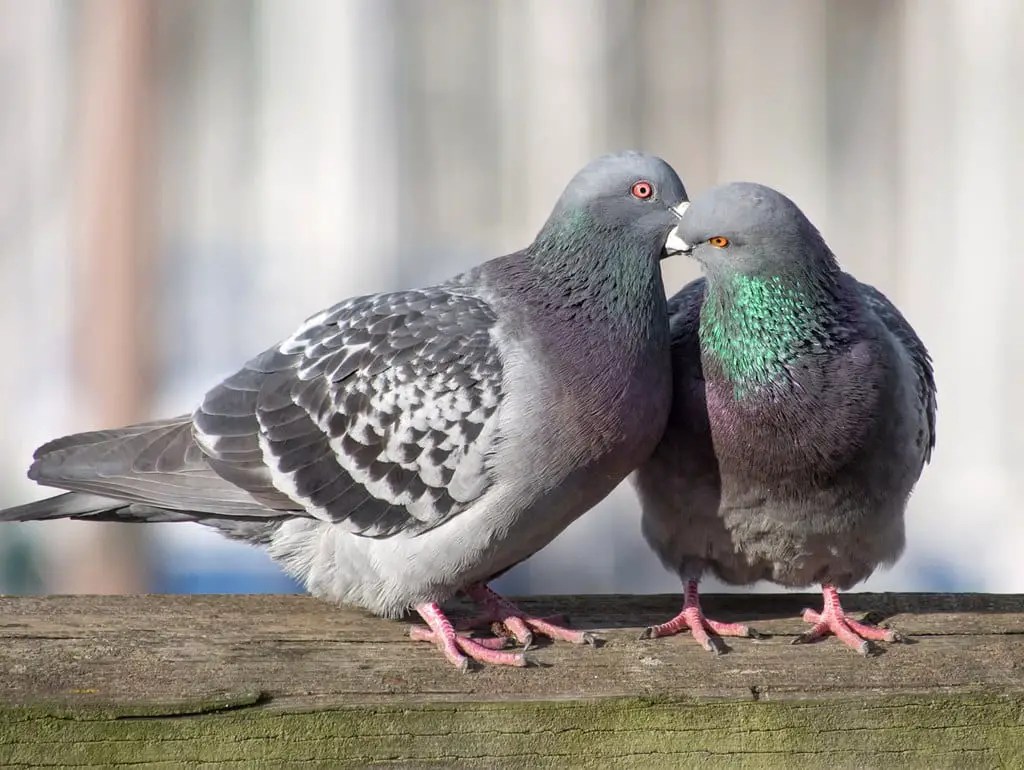
Conclusion
In the quest to understand whether pigeons are aggressive, we have unveiled a multifaceted portrait of these avian inhabitants of our urban landscapes. While some may perceive pigeons as aggressive due to their scavenging behaviors and occasional squabbles over food scraps, a closer examination reveals a more nuanced reality.
Pigeons, Columba livia, have adapted to coexist with humans in bustling cities and public spaces. Their behaviors, often misconstrued as aggression, are more accurately understood as survival strategies honed in response to their environment. These birds are opportunistic feeders, and their seemingly aggressive pursuit of food is driven by necessity rather than malice.
Moreover, studies indicate that pigeon aggression is typically directed towards conspecifics (other pigeons) rather than humans. Their interactions with people are more often characterized by indifference or caution rather than aggression. It is essential to recognize that our perception of pigeon behavior may be influenced by our urban environment and the conditions we create.
In conclusion, while pigeons may engage in squabbles and assertive behaviors among themselves, they are not inherently aggressive toward humans. Instead, they have adapted to thrive in the human-dominated world. Understanding these birds’ behaviors within their ecological context can foster coexistence and appreciation for these resilient urban dwellers.

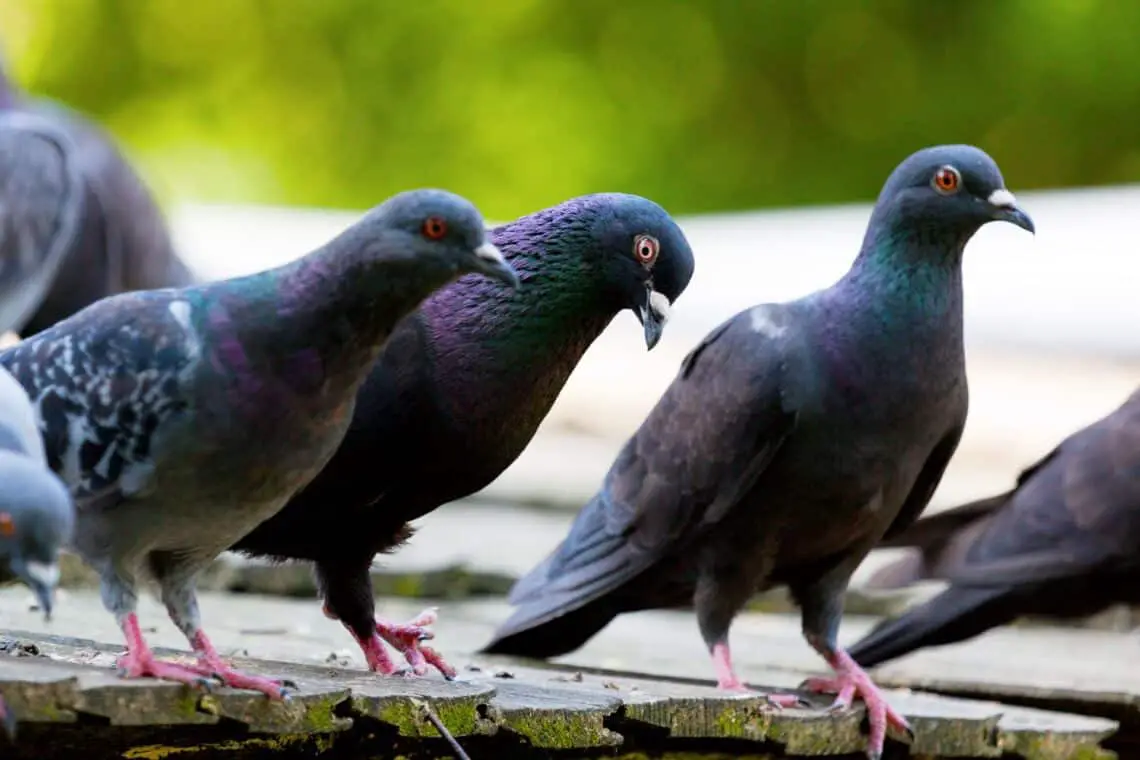
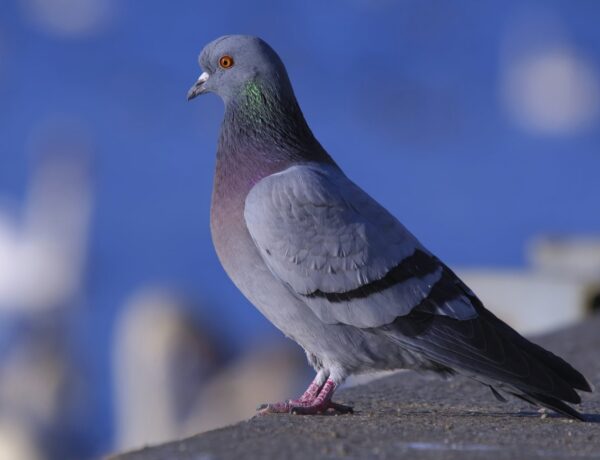
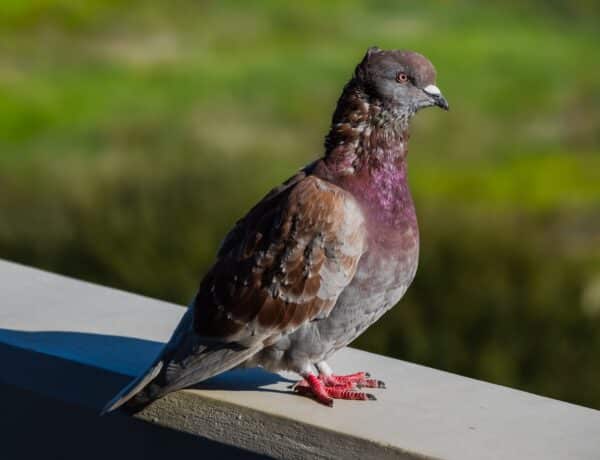
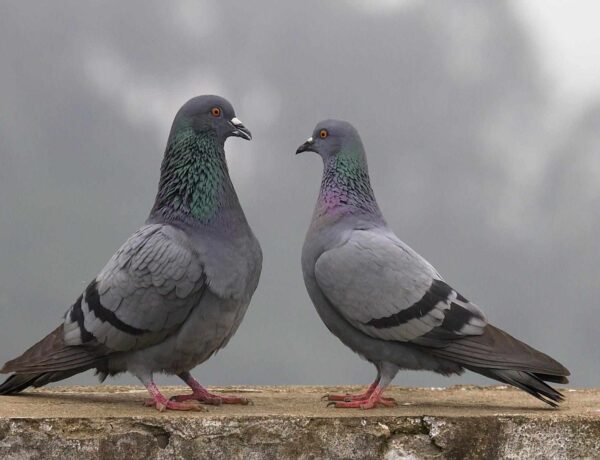
No Comments